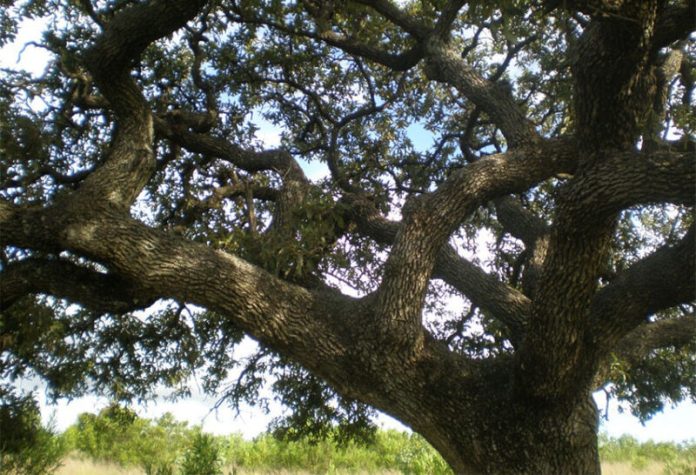“All the ways you imagine us – bewitched mangroves up on stilts, a nutmeg’s inverted spade, gnarled baja elephant trunks, the straight-up missile of a sal – are always amputations. Your kind never sees us whole. You miss the half of it, and more. There’s always as much belowground as above. If your mind were only a slightly greener thing, we’d drown you in meaning.”
I’ve always loved trees — so much so that my entire back is covered in a tattoo of a tree. But the book from which the above quote is taken, Richard Powers’ The Overstory: A Novel, especially helped me to think of trees as living, conscious things and of forests as communities, as opposed to simply natural decorations set into the ground by the gods that may or may not be useful.
While the very definition of consciousness as we perceive it is debatable in terms of which living things it might include, we do now know that trees have more in common with us than we used to think.
They communicate with each other through their roots. They care for their young. They send medicine to their sick compañeros. As an extra touching surprise, we’ve discovered that dying trees send out the last of their nutrients to others before passing, like someone making sure to give away their last cent before heading to the other side.
So whenever I read news articles about trees in distress, I worry about them. What might they be going through?
I’m not trying to show off my interspecies altruism here; I’ve got as many despicable moral blind spots as the rest of us (humans, eh?). But that one line, “we’d drown you in meaning,” speaks to me.
It reminds me that in the community of life, even when there aren’t other people around, we’re not alone.
So here I am to remind us all of how deserving trees are of both our protection and even our love songs — and to sound my barely perceptible piece of the alarm about the danger to them.
The Mexican tree-planting program Sembrando Vida (Sowing Life) is of specific concern, both because of its consequences — which have been contrary to its stated goals — and because faith in the program, at least on an official level, seems to be expanding rather than contracting.
Planting trees that are specifically useful to us, a major tenet of the program is, of course, not something I’m going to rail against. What makes me recoil a bit (and only a bit) is that in doing so, we’re doing it only for us.
The program has shown many cracks since its inception, including accusations that there are not enough saplings to meet the demand, that they are sent out at the wrong time of year for planting, that the on-the-ground organizers are charging farmers to participate in the program and that program officials’ insistence on only enrolling beneficiaries with bare land parcels is encouraging landowners to deforest their plots in order to join.
The president has made it very obvious through his proposed legislation that moving us globally toward a clean and sustainable environment is not a top priority for him, despite claims to the contrary.
Planting trees is great, but billing that as a gigantic step in solving Mexico’s environmental problems is akin to those giant polluting factories — responsible for a very significant chunk of pollution — launching energy-saving campaigns to encourage the public to turn the lights out in their homes while making no effort to find environmentally sustainable production solutions.
Indeed, environmentalists contend that many of President López Obrador’s environmental proposals are wildly outdated.
Then, on top of all that, we’ve got illegal logging by organized crime to contend with — which has depleted about 15% of Mexico’s total territory, which is a lot. My, my. Is there any way that criminal groups aren’t allowed to diversify around here?
If we haven’t been able to protect people, I can hardly see how we’ll be able to protect trees. The will for it doesn’t seem to be there, anyway.
The Sembrando Vida program has problems woven through it, although heaps of confidence are being piled on top of it as a catch-all solution for everything from environmental degradation to mass migration. But what other things could we do to save the environment?
For starters, we could get serious about allowing clean, alternative energy to operate in the country; it’s going to be a reality at some point anyway; the Federal Electricity Commission and Pemex might as well face that reality now and adapt before facing inevitable demise when their supplies run out.
We could develop urban community gardens and more green areas, maybe tear up a bit of the concrete around here that’s contributed so much to flooding — not a bad idea considering how much more intense our weather is getting.
We could focus our efforts on protecting the trees and plants that we have now rather than saying, “Oh, just cut those old ones down; they’re not useful to us” — in that shortsighted way that humans often do.
We could listen when people who intimately know the land they’re living on tell us what needs to happen to keep it safe and healthy.
I hope and pray that we can learn to respect our communities of trees. In the end, it might be their patient and wise presence that ends up saving us rather than the other way around.
Sarah DeVries is a writer and translator based in Xalapa, Veracruz. She can be reached through her website, sdevrieswritingandtranslating.com and her Patreon page.
